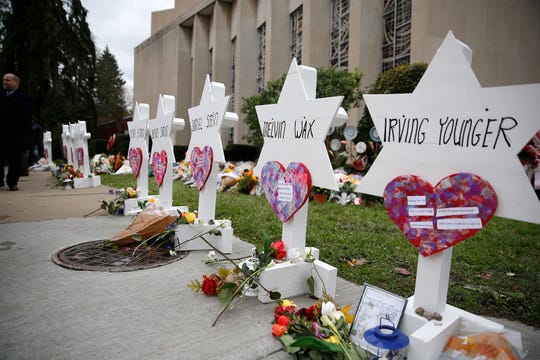Jewish Community Relations Council (JCRC)

[Enquirer] Opinion: One Year Later, Why Pittsburgh Synagogue Shooting is a Warning Sign For Us All
A year ago today, a gunman driven by antisemitic hatred murdered 11 innocent people praying inside Pittsburgh’s Tree of Life Synagogue. This attack also destabilized American Jews’ sense of safety. The attack was unprecedented – it was the first time in 350 years of American history that Jews were killed in their house of prayer simply because they were Jewish. It shook Jewish confidence in the concept of American exceptionalism – the idea that after thousands of years of persecution and genocide in countries throughout the world, America’s founding promise of religious freedom would afford Jews and other religious minorities the kind of safe haven they’d never before known.
For Jews, all of that came into question on Oct. 27, 2018. And then another attack in a synagogue in Poway, California, exactly six months later confirmed a shift many had feared. Virulent antisemitism, while still primarily relegated to the extremes of American society, now made it potentially deadly just to be a Jew praying in an American synagogue.
But the appearance of this deadly strain of antisemitism in America isn’t just a threat to the Jewish community. What happened one year ago today – and the deadly and dangerous trend that has continued since – is a warning to all Cincinnatians and all Americans who value the freedoms our fragile democracy protects. This is true because antisemitism is an early warning sign that democratic and pluralistic norms are eroding.
Holocaust historian Deborah Lipstadt has likened antisemitism to a virus, which explains its persistence throughout millennia. Like a virus, Lipstadt argues antisemitism can never be completely eradicated. Like a virus, it lies dormant when societal “immunity” is strong – when democracy is working as it should through compromise and moderation. And like a virus, it surfaces when our societal immunity is weak – when civil discourse has ground to a halt and extremes are emboldened.
Throughout history – and most notoriously in Nazi Germany – what started with the Jews has never ended with the Jews, thus the often-cited “canary in the coal mine” analogy. The rise in antisemitism has dangerous implications for all of us because it indicates our civil society which protects our democratic liberties is not operating effectively.
Furthermore, when any one group is threatened by prejudice, it’s a threat to America’s entire democratic, pluralistic society. Therefore, antisemitism, like racism, Islamophobia or any other group hatred, requires collective action in order to defeat it. Fortunately, in Cincinnati, that alliance is strong and growing stronger every day. So to reflect on this past year by only speaking of the alarming rise in antisemitism and other bigotry would be to tell only one half of the story. The other half describes how our community has stood up together in the face of hate and collaborated to build a more secure community for all of us.
Vigils after shootings in mosques, synagogues, and churches saw allies gathered to show that we can fight fear with solidarity. Collaborations like the Cincinnati Regional Coalition Against Hate, the Festival of Faiths and other joint efforts have leveraged the power of our diversity in pursuit of a community where no one has to live in fear of being targeted because of perceived difference. Broad coalitions to welcome and assist our city’s new immigrants, to reform the criminal justice system, and to stem the rise in gun violence have moved the needle on these important issues of justice and security and brought us into closer relationship with one another.
Cincinnati is a city that recognizes what today’s somber anniversary means for all of us – Jewish or not. It is a reminder that defeating antisemitism – and other forms of hatred – is our shared responsibility because the consequences of not doing so will also be shared. We must recommit to combating hatred together through stronger and broader coalitions. Good intentions aren’t enough.
This will require brave and difficult conversations. Moreover, we can’t only push back reactively; we must do the forward-looking work necessary to preserve, protect and build on our shared values of freedom, pluralism, and respect for differences.
Jackie Congedo is the director and Ronna Greff Schneider is the president of the Jewish Community Relations Council, the public affairs arm of the Jewish Federation of Cincinnati. Shep Englander is the CEO and Gary Greenberg is the president of the Jewish Federation of Cincinnati.

